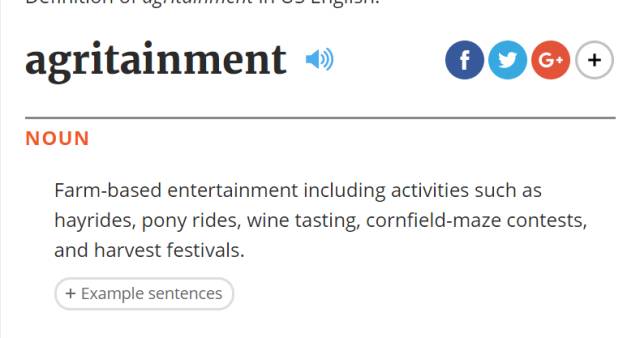“农家乐”已成为广为人知的一种休闲度假选择,翻译这个词时应视语境而定,即注意“虚实”之分。“虚”指作为一种概念的“农家乐”,比如:“农家乐是新兴的旅游休闲形式”中的“农家乐”。“实”则是看得见摸得着的农家乐,比如:“老王投资开了家农家乐”。
对于第一种情况,有两个可以选用的译法:agritourism和agritainment。两个词分别由表示农业的agri-与tourism和entertainment结合构成。其中,需要注意的是agritourism比agritainment更常见。在《韦氏词典》和《剑桥词典》网站搜索agritainment并没有结果;《韦氏词典》对agritourism释义如下:

《牛津词典》可以查到agritainment:

可见,两个词的区别在于agritourism更侧重于真实日常农村生活体验而agritainment侧重于娱乐体验,且agritourism更为正规、常见一些。关于agritourism,HuffPost网站题为Agritourism Destinations: The Best Farm-Oriented Vacations的文章(http://www.huffingtonpost.com/2012/11/14/agritourism-destinations-cities-countries-vacation_n_2130501.html)中就有这样一段话:
Agritourism is one of the fastest growing sectors in the eco-tourism industry. There is nothing new about this form of travel, which involves staying on a farm or other agriculture-oriented property and perhaps even sampling the day-to-day lifestyle of the people who tend the crops or livestock there.
Agritourism不仅限于“农家乐”,还包括与农业相关的旅游,同一篇文章推荐的agritourism目的地就包括了意大利的托斯卡纳和西班牙的马洛卡。
对于第二种情况,即具体的“农家乐”,可考虑译为farm family resort,即基于农家的旅游点。可能有人会用agritourism/agritainment resort,问题在于这样的表达显得较为拗口与一本正经,没有family的亲和力。另一方面,resort就可以担负起tourism和entertainment的作用,说明这是一个娱乐休闲的地方,无需和agritourism/agritainment连在一起使用。比farm familyresort更简单的一种说法是farm stay。根据《牛津词典》,这一表述的意思是:A farm offering accommodation to paying guests,即向客人提供住宿餐饮等服务的农场。
“农家乐”还可以更为具体,比如某某景点农家乐、老张农家乐和老王农家乐等,翻译这些“农家乐”时除了用farm family resort/farm stay,还可以用其他灵活译法彰显这些“农家乐”各自的特点,这里不再详细列举。
(中国翻译研究院)
